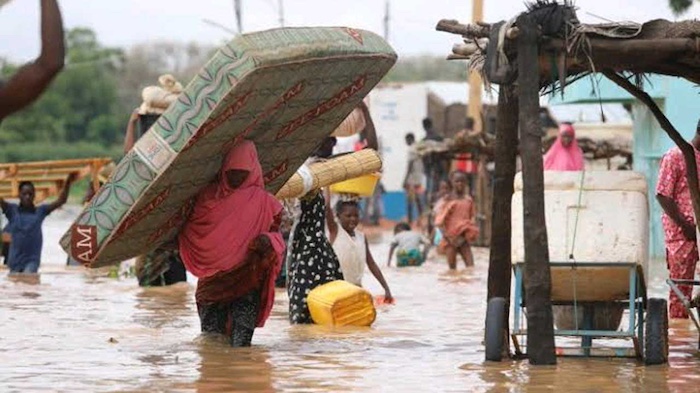Torrential rainfall on Sunday unleashed widespread devastation across parts of Plateau and Bauchi states, as flood destroyed at least 90 houses including schools, worship places, and submerged farmlands, displaced hundreds of residents.
In Plateau State, the Menkaat community in Shimankar District, Shendam Local Government Area, was among the worst hit.
Over 50 houses, including two primary schools and a place of worship, were reduced to rubble by the early morning downpour, which was accompanied by violent windstorms, according to Daily Trust.
Residents reported that the winds uprooted trees, knocked down electric poles, and ripped off rooftops, leaving many homes uninhabitable.
“Many residential buildings have collapsed. The intensity of the rainfall also destroyed farms. People have lost a lot,” Daily Trust quoted Mazawaje Daniel Danjuma, the councillor representing Shimankar, as saying.
Lawrence Longwalk, another resident, appealed for urgent government intervention.
“From the level of damage, the people need urgent help,” he said.
Similarly, in the Dass Local Government Area of Bauchi State, the storm displaced over 40 households and destroyed large swathes of farmland.
According to Adamu Nayola, the Director of Relief and Rehabilitation at the Bauchi State Emergency Management Agency (SEMA), no lives were lost, but “many victims, especially women and children, are now in urgent need of humanitarian assistance.”
Nayola attributed the flooding to a poorly constructed culvert that failed to manage the heavy volume of rainwater and confirmed that SEMA had begun assessments for relief distribution.
Also in Niger State, heavy flooding submerged farmlands in Kafin Koro, Paikoro Local Government Area.
In Lapai Local Government Area, at least 18 communities, including Dere, Apataku, Eshi, Tsakanabi, and Kuchi Kakanda, suffered varying degrees of damage, while many residents fear further losses if the rains persist.
The state government on Sunday issued an urgent advisory urging residents in flood-prone, riverine areas to relocate to higher ground.
Jonathan Vatsa, Special Adviser on Communication, Media and Strategy to the governor, emphasised the gravity of the situation.
“As a government, we will continue to be proactive by appealing to the people, especially those in flood-prone areas, to immediately move upland to avoid another disaster like that of Mokwa,” Vatsa stated.
“We understand the strong connection people have to their ancestral lands, but given the current flood alerts and the realities we are already witnessing, it is crucial that they heed this warning,” he added.
Vatsa reminded the public that the Nigerian Meteorological Agency (NiMet) had identified 15 of Niger’s 25 local government areas as highly vulnerable to flooding in the 2025 rainy season.
The federal government has also issued a red alert for potential flooding in 11 states based on predictions from the National Flood Early Warning Centre under the Federal Ministry of Environment.
Sunday’s devastation adds to a growing list of climate-related disasters across Nigeria this year.
Between March and July 2025, over 250 people were killed and thousands displaced by a series of floods, windstorms, and rainstorms affecting states like Sokoto, Niger, Kaduna, Taraba, Ekiti, Ogun, and Imo.
The deadliest of these occurred on June 11, when a catastrophic flood in Mokwa, Niger State, killed over 200 people and left dozens missing.
Just last week, torrential rains caused severe flooding in Maiduguri, Borno State, displacing hundreds and destroying at least eight buildings in areas such as Bulunkutu, Damboa Road, and Jiddari Polo.
Although no fatalities were reported, many residents remain traumatised, recalling the September 10, 2024, flood that caused widespread destruction.
In Adamawa State, a flood that struck in late July killed five people and injured over 50 others in communities within Yola North and Yola South LGAs.
The worst-hit areas included Sabon Pegi, Yolde Pate, Yola Bypass, and Modire, where homes, roads, and farmland were wiped out.
Experts and government agencies continue to warn that Nigeria may face even more severe flooding as the rainy season peaks.
During the April unveiling of the 2025 Annual Flood Outlook, Minister of Water Resources and Sanitation, Prof. Joseph Utsev, identified dozens of high-risk states, including Bauchi, Plateau, Niger, and the Federal Capital Territory (FCT).
Authorities at both state and federal levels have urged citizens to stay alert, heed evacuation warnings, and support ongoing relief and recovery efforts.

